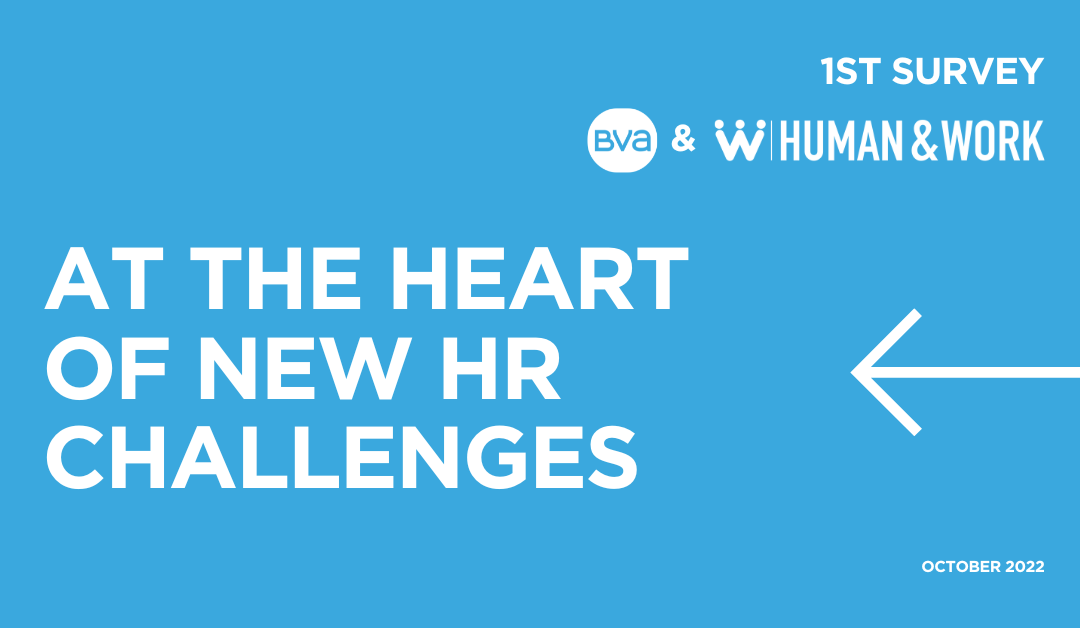Employee engagement and inclusion will be the top work priorities for European HR managers in 2023
Human & Work, Europe’s first consulting group specializing in People at Work, has released the results of its first survey focused on the challenges faced by HR managers in the various countries where it operates.
810 HR managers from French, German, Spanish and Italian companies with more than 50 employees were questioned on how their role is changing, as well as new employee expectations
The survey results highlight the disparities between the priorities and perspectives of HR managers from different countries. However, two major challenges for the HR profession were cited as common issues across Europe:
- Employee engagement, in particular, by improving team cohesion (for 33% of HR managers) and employee recognition (30%), as well as giving meaning to the company’s mission (32% of HR managers want employees to be involved in defining the company’s missions);
- Inclusion, by implementing warning systems to address disrespectful behavior (30%) and adopting more inclusive recruitment policies (28%).
The survey also highlights the challenges HR managers face in getting executives and managers to engage with Social and Environmental Responsibility issues, even though there is a growing expectation for companies to make a positive impact, among stakeholders, as well as candidates and employees, for whom it is a priority.
Online survey conducted with HR Directors and HR Managers from companies with 50 or more employees from June 30 to July 8, 2022.
Improving employee engagement and involvement, the top priority for European HR managers
Unsurprisingly, in light of the current situation, while large-scale resignations, quiet quitting and a loss and shortage of talent are of major concern to most European HR managers, the research conducted by BVA for Human & Work has revealed that HR managers want to prioritize their resources (planning, time, systems, actions, etc.) to maximize employee engagement over the next 12 months.
Three key work priorities were highlighted:
- Improving internal cohesion and the work atmosphere within teams: this is a priority for 33% of European HR managers and is viewed as particularly important in France (38% of respondents), while slightly less so in Spain (29% of respondents).
- Giving meaning to work: 32% of European HR managers want employees to be more involved in defining the company’s missions. France is slightly behind its European neighbours on this issue: 29% of French HR managers consider this a priority, compared to 34% in Germany and Italy.
- Improving recognition (30% of respondents). This figure rises to 34% among French HR managers and 35% for those in Spain but is only 28% among German HR managers.
The determination to address these issues reflects HR managers’ predictions in terms of their employees’ future priorities. In order of priority, they cite: the atmosphere within teams (38%), the social climate within the company (38%) and cooperation between teams (37%). Next comes maintaining a work-life balance (32%), receiving recognition for their work and commitment (30%) and finding meaning and purpose at work (30%).
Opinions on these issues differ widely between countries: Germans place particular emphasis on group cohesion (the atmosphere within teams and the social climate, for 45% and 43% of HR managers respectively), while only 26% of Spaniards and 31% of Italians consider the atmosphere among teams to be a key priority for their employees (this figure increases to 38% in France).
As for showing explicit recognition of employees’ work and commitment, only 17% of Italian HR managers view this as a priority expectation for their staff, compared with 32% of French HR managers and 34% of German HR managers.
Lastly, while 32% of French and 31% of German HR managers rank giving meaning to work among the priority expectations of their employees, only 23% of Spanish HR managers cite this issue.
Inclusion, the second major challenge for companies in 2023
At a time when workplace violence is being openly discussed and with the definition of sexual harassment having been broadened in French law in March 2022, HR managers from all of the four countries surveyed highlighted the importance of establishing and/or further developing warning systems to deal with disrespectful or discriminatory behavior. Consequently, 30% of European HR managers cite this as a priority action, with this figure rising to 42% in France and 39% in Spain. In contrast, only 22% of German HR managers consider this a priority action.
Inclusion of senior workers is also a key issue for the HR managers surveyed: 92% state that they try to retain senior employees at the company for as long as possible (with 38% answering “yes, definitely” and 54% “yes, somewhat”). In addition, 66% say that there are HR policies in place for seniors (26% “yes, definitely” and 40% “yes, somewhat”).
Despite these good intentions, 55% of HR managers are still reluctant to hire senior workers. However, French HR managers seem to be the least averse to this idea: only 38% state that they are reluctant, compared to 61% in Italy, 58% in Germany and 55% in Spain.
This result is rather surprising in light of the reality on the ground: in France, although the labor force participation rate of seniors (55-64 years old) has been steadily increasing since 2000, this figure stands at just 56% in 2021*. Similarly, according to the survey conducted by the Defender of Rights and the ILO (International Labour Organization) in December 2020, age is one of the primary reasons for discrimination against employees, after ethnic origin or skin color, state of health or disability and physical appearance. Among those who have experienced discrimination or discriminatory harassment in the workplace, 10% report having been discriminated against due to their advanced age.
*Source: Eurostat (Germany: 72%; Spain: 56%; Italy: 53%)
Corporate social responsibility, an integral part of the HR manager’s roadmap, for which mobilizing resources is a challenge
Fundamental to improving employee engagement as well as enhancing the employer brand, the implementation of companies’ impact plans is now a major part of the HR manager’s role. 92% of HR managers surveyed said they were already involved in managing CSR issues. Unsurprisingly, the social element (pension plans, social and community initiatives, working relations and conditions) comes top in terms of priorities for integration into companies’ operations (referred to by 60% of HR managers), followed by the environmental dimension (protecting the planet and supporting the environmental transition), cited by 55% of HR managers. Spanish HR managers place particular importance on the social aspect (68%), in contrast to Italians, only 51% of whom identified this issue.
Widescale resignations have been reported in several countries since the health crisis, a phenomenon that can be partly explained by the need to find meaning and feel useful at work. Businesses are tackling this issue head-on by making a point of involving employees in defining the company’s missions (32% of HR managers say they want to focus their resources in this area) and making the company’s mission and purpose more explicit (23% of HR managers say they want to mobilize their resources in this field over the next 12 months).
Nonetheless, 76% of HR managers feel that they encounter difficulties in defining and implementing action plans based on the various topics covered by CSR, and 75% state that getting executives and managers to engage with these issues is a challenge.
Spanish HR managers seem to have the most difficulty in getting executives and managers to engage with CSR policies (87% of respondents), as well as in defining and implementing action plans based on the various CSR themes (82%). The responses from French HR managers are in line with the European average.
How will the HR profession change in the future?
When considering the future of their profession, the HR managers surveyed underlined two key changes:
- the need for more detailed knowledge of employee skills, motivations and personal development aims (48% of HR managers state they “totally agree” with this statement, which is of particular importance for Spanish HR managers (64%), in contrast to those in Germany (42%), with France: at 54%;
- the importance of contributing to innovation within the company, particularly in terms of organization and new ways of working (42% of HR managers “totally agree”, 59% in Spain vs. 36% in Germany, with France: 45%).
A large proportion of respondents highlight a lack of resources as a challenge for the future, whether financial (34%) or human (32%), and this is particularly true in France (46% and 41% respectively).

According to David Mahé, CEO and Founder of Human & Work:
«With this survey, which we aim to conduct yearly, we want to give European HRDs a platform in order to gain a deeper understanding of their expectations and predictions for the future world of work. The world of work is currently changing at an exponential rate, and brings a rapid evolution of the missions of the HR function. At Human & Work, we know how complicated the new demands that are emerging, particularly on the part of employees and candidates, can be for companies and their managers to handle and how much support is needed.
It is reassuring to note that the two priority challenges that emerge from this survey for HRDs in 2023, employee engagement and inclusion, are issues that we are already working on a daily basis for our clients. Our goal is always the same: to build together an inclusive, responsible and serene workplace.»
Want to download the full study?
Please enter your email address:










